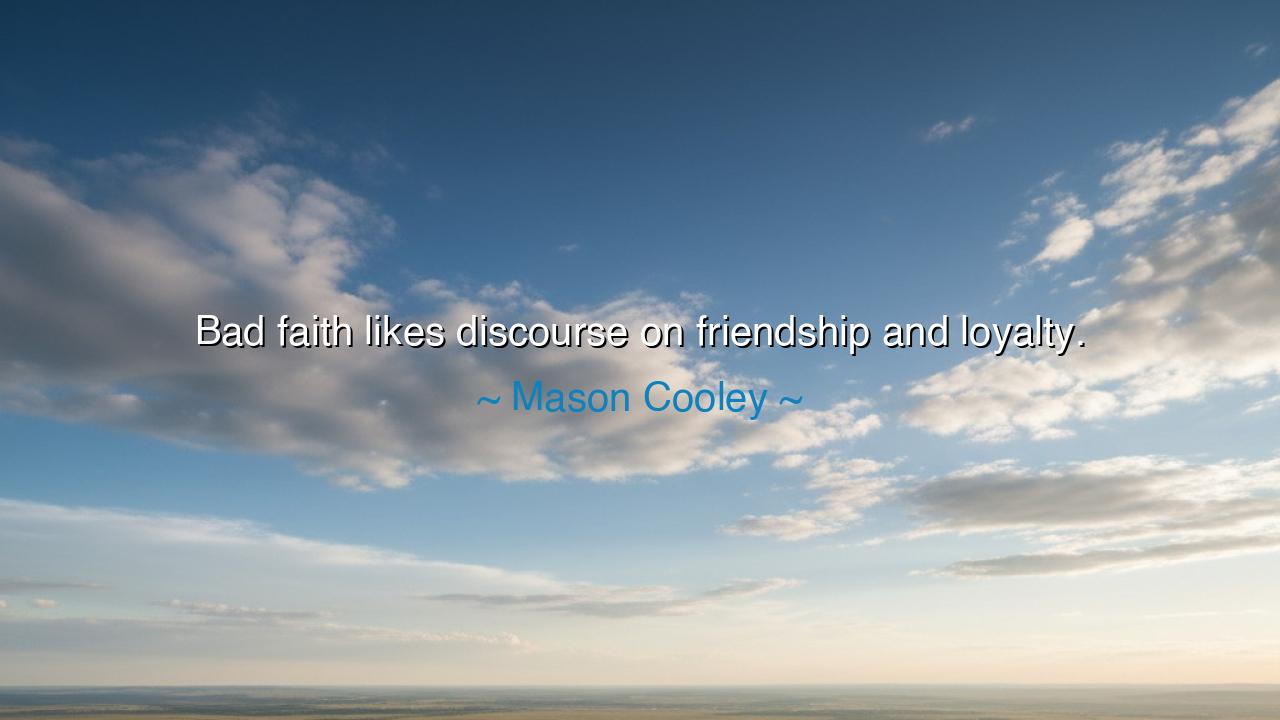
Bad faith likes discourse on friendship and loyalty.






"Bad faith likes discourse on friendship and loyalty." These words from Mason Cooley strike with the quiet force of truth, revealing a deeply held secret about human nature. In them, he speaks not merely of the betrayal of friends or the violation of loyalty but of a more subtle and insidious force: bad faith. It is a force that cloaks itself in the language of friendship, that wraps itself in the sweet words of loyalty, and yet underneath it all, it betrays the very ideals it espouses. Bad faith, in Cooley’s vision, is not the absence of these virtues but their corruption, a distortion of their true meaning for the purposes of deception.
The ancients were no strangers to the danger of falsehood in relationships. The great Greek philosophers, especially Socrates, often cautioned against the seductive power of appearances. In his dialogues, Socrates would probe the minds of his fellow Athenians, questioning the nature of their words and deeds. How many times, he would ask, had men claimed loyalty, only to turn their backs when it mattered most? Bad faith thrives in this space—in the space where words of friendship are spoken, but the intentions remain selfish and hollow. Just as Socrates sought to unmask the false virtues of those who spoke of justice but lived in deceit, Cooley reminds us that discourse on friendship and loyalty can be the very playground of those who have no intention of honoring either.
Consider the ancient tale of Julius Caesar and his so-called friends in the Senate, most notably Brutus, whose name has become synonymous with betrayal. Caesar, having risen to great power, surrounded himself with men who declared their loyalty, who praised his leadership, and yet beneath the surface, many harbored jealousy and ambition. When Brutus struck the final blow, his words echoed the language of friendship: "Et tu, Brute?" He, who had been seen as a close companion, used the discourse of loyalty and honor to justify the act of betrayal. His bad faith was in the use of friendship as a mask for personal ambition. The lesson here is clear: even the most loyal of friendships can be undermined when one’s true intentions are hidden behind the facade of virtue.
In a more modern context, bad faith finds its way into the world of politics, business, and personal relationships. It cloaks itself in the language of cooperation, promising mutual benefit and the honor of shared values, but in reality, it seeks only to manipulate, to control, to use friendship and loyalty as tools for self-serving ends. Think of the corrupt leaders who rise to power not by the strength of their ideals but by the manipulation of trust and the strategic use of loyalty as a way to create dependency. The loyalty they demand is not given freely, but coerced, and the friendship they offer is a lie, a mere stepping stone on their path to greater control.
The lesson that Mason Cooley imparts to us is one of vigilance. It is not enough to merely speak of friendship or loyalty; we must seek the truth behind the words. Bad faith does not announce itself as such. It wears the guise of honesty, but its actions reveal its true nature. The deepest betrayals often come from those who are closest to us, those who speak the loudest about their loyalty and their commitment to our well-being, only to abandon us when the stakes are raised. Friendship and loyalty must be earned through actions, not mere words. We must be wary of those who speak of these virtues too freely, for it is often in the abundance of their promises that their bad faith is most clearly revealed.
To guard against bad faith, we must turn our gaze inward. Friendship is a mirror, and in it, we see not only the reflection of others but of ourselves. We must ask: Do our actions reflect the truth of our intentions? Are we loyal to those we call friends, not merely in words, but in deeds? And when we encounter others who speak of loyalty and friendship, let us not be swayed by the elegance of their discourse alone. Instead, we must seek the truth of their hearts through the consistency of their actions. True loyalty and true friendship require no embellishment, no grand speeches. They are simple, yet profound, and they are revealed not through what is said but through what is done.
The path forward, dear listeners, is one of discernment. Friendship and loyalty are treasures, but they must be safeguarded from the forces of bad faith. Let us walk with our eyes open, our hearts true, and our actions consistent with the values we hold dear. In this way, we will not only protect ourselves from betrayal, but we will cultivate the kind of authentic relationships that are the true foundation of a good and meaningful life.






AAdministratorAdministrator
Welcome, honored guests. Please leave a comment, we will respond soon